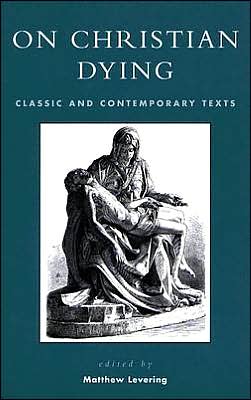

 |

|

The average rating for On Christian Dying: Classic and Contemporary Texts based on 2 reviews is 4.5 stars.
Review # 1 was written on 2012-09-29 00:00:00 Sherry Garten Sherry GartenThe excerpts in this book demonstrate the ambiguity in Christian approaches to death. The tradition simultaneously affirms that Death is the great enemy that has been 'put to death' in Christ's death, and so is to be hated by Christians as destructive of God's creation. But precisely because Death has been put to death in Christ, 'death' can now in some sense be welcomed, and it is that which ushers the Christian into the presence of God, as the excerpt from John of the Cross demonstrates ('Death cannot be bitter to the soul that loves, for in it she finds all the sweetness and delight of love....She thinks of death as her friend and bridegroom, and at the thought of it she rejoices as she would over the thought of her betrothal and marriage, and she longs for the day and the hour of her death more than earthly kings long for kingdoms and principalities' (99)). But as Thomas More writes in The Sadness of Christ, a moving treatise written while More was awaiting his own death in the Tower of London, that death can now be seen in some sense as friend and that it can be faced with courage does not mean that it is not to be feared: 'The brave man bears up under the blows which beset him; the senseless man simply does not feel them when they strike. Only a foolish man does not fear wounds, but a prudent man does not allow any fear of suffering to divert him from a holy way of life, for that would be to refuse lesser pains at the expense of plunging himself into far more bitter ones' (81). Christ himself became weak and suffered the fear and agony of death in order to help us who are weak to face death (87). Several of the excerpts describe the metaphorical sublation of death and resurrection into the shape of the Christian life as well. Most moving in this regard is the excerpt from Therese de Lisieux: 'Yes, my beloved, this is how my life will be consumed. I have no other means of proving my love for you other than that of strewing flowers, that is, not allowing one little sacrifice to escape, not one look, one word, profiting by all the smallest things and doing them through love. I desire to suffer for love and even to rejoice through love; and in this way I shall strew flowers before your throne. I shall not come upon one without unpetalling it for You. While I am strewing my flowers, I shall sing, for could one cry while doing such a joyous action? I shall sing even when I must gather my flowers in the midst of thorns, and my song will be all the more melodious in proportion to the length and sharpness of the thorns...O Jesus, of what use will my flowers be to You? Ah! I know that this fragrant shower, these fragile, worthless petals, these songs of love from the littlest of hearts will charm You. Yes, these nothings will please You. They will bring a smile to the Church Triumphant. She will gather up my flowers unpetalled through love and have them pass through your own divine hands, O Jesus. And this Church in heaven, desirous of playing with her little child, will cast these flowers, which are now infinitely valuable because of Your divine touch, upon the Church Suffering in order to extinguish its flames and upon the Church Militant in order to gain the victory for it'! (128-9) A great series of meditations on the shape of death in the Christian tradition. |
Review # 2 was written on 2017-05-18 00:00:00 Jared Elliott Jared ElliottI wanted to learn more about moral absolutes and see if there is any way I could learn about it independent from the religious context (although found out quickly that Finnis himself ties it to Catholicism quite a bit). I also wanted to challenge myself with a topic with which I disagree. Excited to learn, I picked up this book soon to find that it's written in the most tangled academic language hard to make sense of (especially the first chapter). I struggled through that, but it got better in the following chapters and I could follow the author a little better. There were a lot of parts where I could not situate the author's arguments under certain perspectives. I disagreed with the author a lot. A highly intellectual read, deeply philosophical and grounded in religion, I can now say that I learned a little more about moral absolutes and that I disagree with any absolutism even more now :) |
CAN'T FIND WHAT YOU'RE LOOKING FOR? CLICK HERE!!!